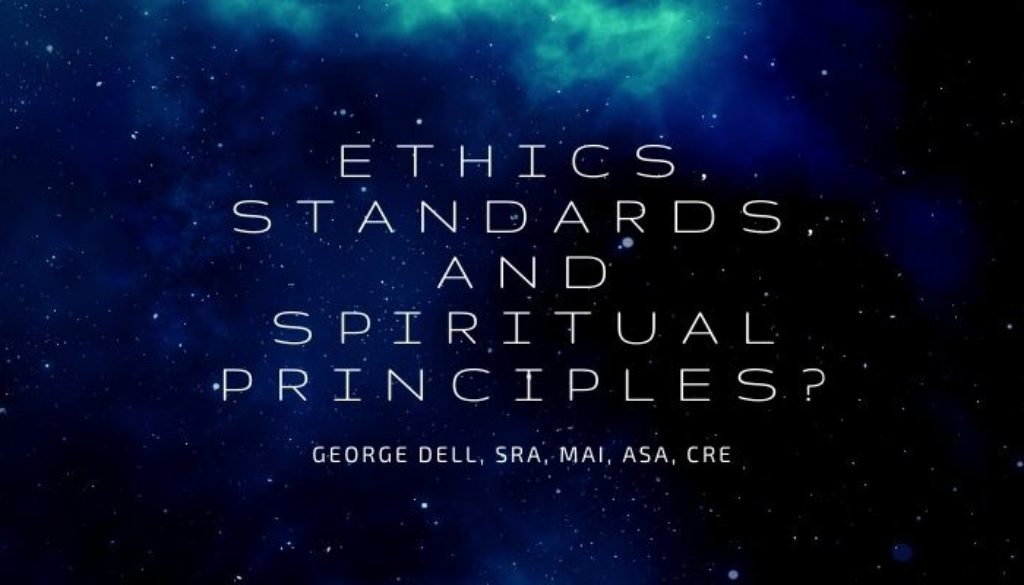Appraiser learning is replete with admonitions to good ethics. These are “enforced” by standards, believability conditions, and even ethical ‘rules.’
Many of us base our lives on spiritual principles (which may or may not be attached to any particular religion). In professional service, it is good to have business ethics align with our personal intent to our personal practice of spiritual values.
As always, let’s first agree on our definitions:
- Ethics: moral principles to guide behavior or conduct of an activity;
- Spiritual: affecting the human spirit (rather than material/physical things);
- Principle: a fundamental truth assumed of a system of behavior or belief.
The ‘Ethics Rule’ in USPAP, as written by the Appraisal Foundation, requires the “highest standards” of professional ethics. AND requires compliance with its own Standards. It continues with instructions on Conduct, Management, and Confidentiality.
Conduct comprises unbiasedness, “impartiality, objectivity, and independence.” Several other ‘must nots’ follow. Management deals with fees and contingent conditions. Confidentiality deals with client relationships, laws and regulations, and exceptions to confidentiality. But these feel like admonitions and rules, rather than “moral principles” to guide behavior.
Might we instead do better in the realm of the spirit? Spirit is what gives life to physical things (like cheerleaders at games, or beliefs of any kind). The concept of ‘mojo’ applies here. Spirit is that intangible mix of body chemistry, mental attitude, and drive. Spirit.
Any endeavor is best driven by spirit, competence, and intent.
So how can ethics and spirit be brought into a profession? Can ethical behavior be learned? Yes. And if ethics can be learned, it can be taught.
It is easy to just write ethical standards, rules, laws, and admonitions: “Be good, or a strike of lightning will light you up!” But remote control platitudes do not work. We speak here of the spirit, not the letter. It must come from within – part of the whole of the human life-force.
So what about ethical motivation for valuation and risk estimation? Can it be learned? Can we teach it? Can it be brought to bear on automated models, non-appraiser appraisals, and appraiser appraisals? For now, we can only consider the appraiser appraisal (a valuation done by a licensed appraiser).
The challenge of ethical motivation lies both with individual learning of ethics, as well as a system which seems to thwart and obscure and complicate the real goal: the public trust – the truth.
Good news. We already have a body of knowledge on the topic! It goes back to the days of someone named Socrates. Learning and teaching does take place. All the time.
The formula: Ethics is knowing what we ought to do. This can be taught. But there is a catch. The learner must be able to learn, and be motivated. Motivated to see ways in which ethical behavior benefits self, and helps those who matter … including clients and the spirit of the whole – the public trust.

December 29, 2021 @ 8:21 am
This is something we have talked about over the decades. Ethics can be taught, and yet there is no ind I ustry wide ethics courses. The AI has a course but it is only required for designated members, then once every 5-years.
I am surprised that the AF has not created a course and made it mandatory.
I took two courses in college and still remember some of the case studies of national firms whose choice of profit over ethics resulted in multiple deaths (think Ford Pinto, or “O” Rings as in space shuttle.).
USPAP authors presume every licensee knows what ethics are, which is an erroneous assumption.
Rather than teach ethics, we have an industry that has been conditioned to give customer service.
About half of the attorneys that call me are looking for an advocate for their view of the case, not the truth. Which is why I am not the busiest appraiser on the block.
January 13, 2022 @ 7:39 am
George, you are so right on target with this article. It needs to be taught, however, it thing it will take a long time. The people who don’t adhere to the principle you outline may never fully use them. We all are a mixture of the tapes in their head from Parent figures in their youth and decisions early in life. There was an axiom in the south years ago that says “If you want to make a lady, start with the grandmother”. How unfortunate but true this quote is. You have identified the problem. Arriving at and implementing the solution that alters human behavior is the next step. I do admire your efforts to initiate change.